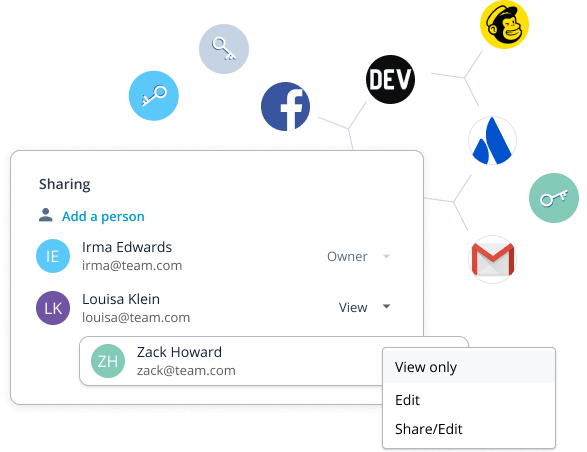Dashlane alternative that is worth the switch
Dashlane has been a top player in the password managers market for quite some time. The US-based tool positions itself as more than a password manager that provides a wide range of services, such as a virtual private network, VPN.
However, first and foremost requirement for sensitive data is uncompromised security and privacy.
This is why PassCamp is reasonably the best Dashlane alternative for people prioritizing compromise-free data security. Recognized security architecture, privacy by design, researched (and fulfilled) users’ needs are what makes PassCamp a worth switch from Dashlane.
Security – Dashlane vs. PassCamp

Both Dashlane and PassCamp are undeniably strong leaders in cybersecurity. Both tools have a military-grade security architecture (powered with Zero-knowledge and 256-bit AES encryption) that has not been breached.
Yet, PassCamp is known for its additional advanced solutions – RSA-4096 asymmetric encryption and a unique approach to vaults ( each password acts as a separate vault). Added security measures make PassCamp a globally recognized tool when seeking excellent security.

Also, both password managers provide Two-factor authentication with multiple verification choices – mobile-based authentication apps like Authy or Google Authenticator, a biometric login.
Basics – comparison of free versions
Both password managers provide free versions where such basics as secure password storage, sharing, autofill, autosave, and password generator are included. Despite the basics, PassCamp, a Dashlane alternative, provides more unlimited features.
Need passwords on both PC and phone? Check this Dashlane alternative.
In Dashlane’s free version, the user can use the tool on only one device. This means, if you wanted to access the password you saved on your mobile phone on a laptop, you couldn’t do that. The only choice would be to create two different accounts and manually duplicate the passwords.
PassCamp provides cross-platform usage with all the available plans, including the free one. This means that from day one, you have hassle-free access to the same password on the mobile app, web app, and browser extension.
PassCamp allows sharing your passwords with as many people as you need
If you are a freelancer or a service provider and have many clients to share passwords with, PassCamp comes in handy. This Dashlane alternative never limits the number of people you can share passwords with.
Dashlane, on the other hand, does – you can share passwords to only up to 5 accounts.
Limitless usability with Premium
Both Dashlane and PassCamp provide premium plans. It’s worth noting, though, that PassCamp offers more competitive pricing for its users.
Dashlane offers four personal plans – free, essentials, premium, and family. Unlimited devices and limited dark web monitoring come only on a premium plan which costs 3,99€ monthly (or 3,33€/month if billed yearly).
PassCamp offers two personal plans – free and premium. PassCamp Premiumunlocks limitless features for a lower price – 2,50€ monthly (or 2,08€/month if billed yearly). For unlimited passwords and devices, PassCamp premium is the plan to go for.
Comparison of team plans
Both password managers offer team plans, starting from 2,9€ per user monthly in PassCamp (if paid annually) and 5€ per user monthly in Dashlane.
In addition to the features in the personal premium plan, Dashlane provides a few extra features (as group sharing and support).
In comparison, PassCamp – a password manager that was primarily built for teamwork – provides some unique team-focused solutions.
PassCamp’s extra – improved sharing

PassCamp’s team plans are focused on providing a seamless teamwork experience and privacy. Different from Dashlane, PassCamp offers a multi-tier sharing feature. This feature simplifies sharing inside a team, and eliminates manual, individual sharing. With this feature users can share a password with another person by assigning them item sharing permission, so then he can distribute the password further to other team members. This allows a team to set up password hierarchy inside the organization, where the team administrators can maintain control over all passwords, while delegating actual password distribution to projects managers or team leaders.
Lastly, PassCamp provides free password sharing with an unlimited number of guests (your external business partners, freelancers or clients).
This way, you don’t need to make any security compromises – you can provide your partners and clients a safe way to share sensitive data with your organization.
Conclusion
Although both password managers are among the best password managers in the market, PassCamp might be considered an effective Dashlane alternative.
With its clear-cut security architecture recognized by the tech leaders and its sharp focus on unlimited features and seamless team collaborations, PassCamp might be just a perfect switch from Dashlane.




